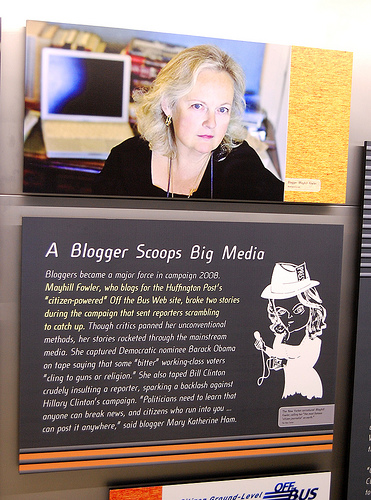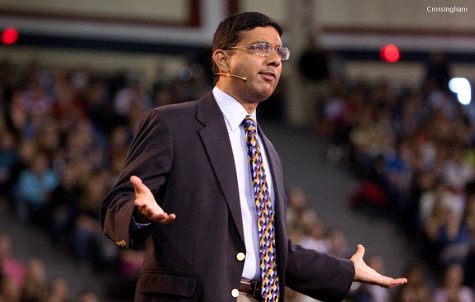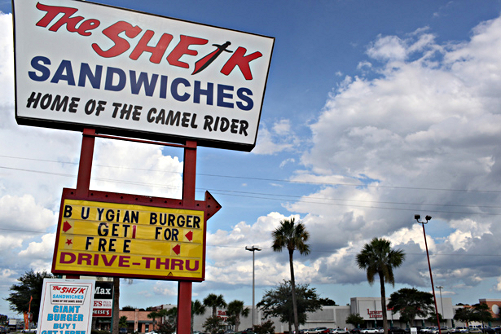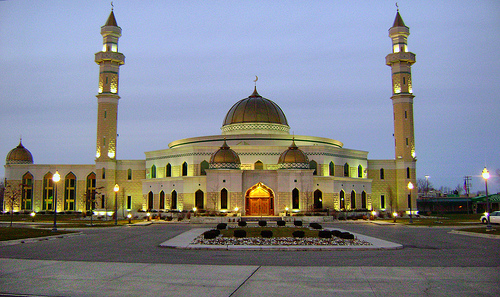Mayhill Fowler Breaks Free of Huffington Post
When I visited the Newseum in Washington last year, I had a pang of journalistic envy over a display honoring Mayhill Fowler, the blogger who broke the "clinging to guns and religion" story about Barack Obama during the 2008 presidential campaign. Fowler was one of the Huffington Post's legion of unpaid citizen journalists, covering the race like a swarm of locusts.
Fowler burned her bridges at Huffington this week, writing a public resignation letter after she couldn't convince the site's editors to start paying her for journalism.
I would not expect to be paid for punditry. The Huffington Post business model is to provide a platform for 6,000 opinionators to hold forth. Point of view is cheap. I would never expect to be paid there when the other 5,999 are not. However, the journalism pieces I have done in the past year seem to me as good as anything HuffPost's paid reporters Sam Stein and Ryan Grim produce. Why do they get money, and I do not?
She's getting roughed up in the comments, particularly by journalists who think the work-for-free crowd is making it impossible for them to earn a living. But it's not like it was ever easy to establish a print journalism career. The entry level pay is horrendous. Back in the '80s, I had a college friend whose first newspaper job paid so little he lived out of his car. Another was offered an internship for Nightline that didn't pay a cent, despite the fact the show was making millions for ABC.
Reading Fowler's story, I am struck by the amount of time she continued to write for Huffington without compensation. She gave them two years of free labor after she established her name as a political reporter, but it doesn't sound like she was ever treated well by the site despite bringing it considerable media attention.
If you want to see how much Huffington Post values citizen journalists, the response to Fowler by site spokesman Marco Ruiz makes it pretty clear:
Mayhill Fowler says that she is "resigning" from the Huffington Post. How do you resign from a job you never had?
Arianna Huffington praised Fowler in an interview this year, saying that she "showed how much a citizen journalist could influence a national election."
In the same interview, Huffington pointed out that her site has a valuation of $100 million.
Once Fowler valued herself higher than $0, she became a nobody to them.
Related posts:
- A Huffington blogger who worked with Fowler has a different take: "Mayhill still doesn't get that many people still hold a grudge against her for BitterGate."
Comics Publisher Has Lousy Rep with Freelancers
The small comic book publisher Bluewater Productions keeps getting an enormous amount of mainstream media attention for publishing cheezy comics about celebrities and other public figures, like its upcoming biographical book about Facebook founder Mark Zuckerburg:
Bluewater Productions Inc. is doing a "giant-sized" 48-page bio-comic that will explore the question, "Who is the real Mark Zuckerberg?"
The company said it had good success with comics like its "Female Force" series featuring women like Hillary Rodham Clinton, Sarah Palin, Michelle Obama and Oprah Winfrey. The company has done other bio-comics about soccer's David Beckham and singer Lady Gaga.
So, Bluewater believes there's an audience for a $6.99 comic book about Silicon Valley's latest young billionaire, who Forbes magazine says is now worth more than Steve Jobs.
I would pay $6.99 not to get to know the real Zuckerberg.
One thing that the press doesn't report about Bluewater is that the company offers its creators an incredibly lousy contract.
The artists and writers aren't paid any advances, collecting only a royalty if the book meets the contract's definition of a profit. The company has in its short life amassed an impressive collection of disgruntled ex-freelancers. The artist Sean Gordon Murphy, now working with DC Comics on Joe the Barbarian, did his first job for the publisher. He said in an interview, "I never got paid. From what I can tell the owner has published that stuff illegally and is continuing to burn people under a new name, Bluewater."
Chase.Com Website Down for Hours
J.P. Morgan Chase Credit Card customers have been unable to check credit card activity online or pay credit card bills for at least 12 hours Tuesday. Currently, customers trying to log into their accounts on Chase.Com get the message, "This website is temporarily unavailable. We're working quickly to restore access, and we encourage you to log on later. Thanks for your patience."
![]() The site offers customers access to credit card information, checking and online bill paying services. The credit card provider has 16.5 million customers who use its online banking services.
The site offers customers access to credit card information, checking and online bill paying services. The credit card provider has 16.5 million customers who use its online banking services.
Several customers exchanged information about their experiences on Yahoo Answers. "For what it's worth, I haven't been able to get on it since yesterday. Got different messages," wrote one customer. "First, one about maintenance. Next, one about upgrading their website and now, just an apology and try again soon. Kind of scary when you can't check cc activity. They obviously have a serious problem, routine maintenance does not take that long."
A spokesman for the company contacted by ABC News said that the server outage is due to an unspecified technical problem. No estimate has been provided on when the problem will be resolved and service will be restored.
Gingrich, D'Souza: Obama Has 'Kenyan' Behavior
Although I try to stay out of political discussions on Facebook to avoid harshing anyone's mellow, I couldn't help myself when it came to Newt Gingrich's recent statement that President Obama exhibits "Kenyan, anti-colonial behavior":
Citing a recent Forbes article by Dinesh D'Souza, former House speaker Newt Gingrich tells National Review Online that President Obama may follow a "Kenyan, anti-colonial" worldview.
Gingrich says that D'Souza has made a "stunning insight" into Obama's behavior -- the "most profound insight I have read in the last six years about Barack Obama."
"What if [Obama] is so outside our comprehension, that only if you understand Kenyan, anti-colonial behavior, can you begin to piece together [his actions]?" Gingrich asks. "That is the most accurate, predictive model for his behavior."
This is incredibly ugly rhetoric, given the lack of any rational reason why the president would be described as Kenyan.
Obama was born in Hawaii and lived in the U.S. through age 6. He moved to Indonesia when his stepfather's student visa was revoked by that country, returning at age 10 to Hawaii where he was raised by his maternal grandparents. He lived in the U.S. thereafter, graduating from Columbia and Harvard universities, serving as a state legislator and U.S. senator in Illinois and raising a family in Chicago.
Accusing him of "Kenyan" behavior -- when he's never lived in that African country and had zero relationship with his Kenyan father -- seems like a creative, right-wing intellectual way of calling him an un-American [slur].
The D'Souza article Gingrich likes so much is written to make Obama seem like he's not as American as the rest of us:
Here is a man who spent his formative years -- the first 17 years of his life -- off the American mainland, in Hawaii, Indonesia and Pakistan, with multiple subsequent journeys to Africa.
D'Souza groups Indonesia and Pakistan with the American state of Hawaii, suggesting that for his first 17 years Obama lived in places with exotic foreign values. Alaska isn't part of the mainland either, but I can't imagine he'd make the same insinuation about Sarah Palin. Even better, D'Souza was born in Mumbai, India, and lived there for his first 17 years until coming to the United States through an educational program.
You know this country is a melting pot when a guy who became an American citizen at age 29 can use a national magazine to question whether the president of the United States, who spent all but four years living in this country, is American enough.
Visiting 30 Mosques in 30 Days
Aman Ali and Bassam Tariq are spending Ramadan on a 12,000-mile road trip, visiting mosques across America and writing about their experiences on 30 Mosques in 30 Days. They were interviewed by NPR at the start of the trip:
... a lot of Muslims that live in small communities across the country, whether it be the Midwest, down South or even on the West Coast, they might feel, "I'm the only one going through this struggle. I'm the only kid in school that has a funny name. Or I wear a headscarf -- I'm a Muslim woman -- and I get dirty looks and, you know, people make me feel uncomfortable."
So this is a way to show that we're not the only ones going through our struggles ourselves, you know. Ramadan is a month to bring people together.
One of the first mosques they visited was the Park51 mosque two blocks from Ground Zero.
They made a stop last week here in Jacksonville at the Islamic Center of Northeast Florida on the city's southside.
As they drove to the mosque, they spotted a "hilariously racist" sign for The Sheik, a sandwich shop that describes itself as "Home of the Camel Rider." I've seen that place for years but been afraid to eat there. A CNN.Com reporter accompanying Ali and Tariq was more courageous:
Wayne [Drash] isn't fasting so he decides to go inside and order this place's infamous Camel Rider sandwich. He walks outside showing me what's the sandwich: ham, salami, and American cheese.
"I think this is probably the most American sandwich that you could possibly eat," Wayne says.
If you're as disgusted as I am by the round-the-clock media narrative that Muslims are anti-American subversives who attend "terror mosques," check out Ali and Tariq's excellent adventure.
Do We Believe in Freedom of Religion or Not?
I am one of the 52 percent of Americans who believe that Muslims should be able to build mosques wherever any other people can build houses of worship.
That number should be 100 percent.
When I first heard about the mosque two blocks away from Ground Zero, I thought it was a non-issue. Two city blocks is a long distance. It's not a "Ground Zero Mosque" -- no one called the former tenant the Ground Zero Burlington Coat Factory. The strip club around the corner is not the Ground Zero Strip Club. The community and zoning authorities in Manhattan overwhemlingly approved the project and Faisal Abdul Rauf, the imam in charge of the project, is so respected that Presidents Bush and Obama have sent him to do outreach to international Muslims.
It has been extremely disheartening to watch anti-Muslim fervor sweep the country fed by Fox News, the New York Post and other right-wing media. The people who have fueled this controversy the most, such as the blogger Pamela Geller, are motivated by a fierce hatred of Muslims. They've been telling blatant falsehoods to stir outrage about the project, such as the untrue claim that it was scheduled to open on Sept. 11, 2011. (To give you an idea of Geller's credibility, this frequent Fox News guest has used her blog to spread the claim that President Obama's father is secretly Malcolm X.)
A lot of Republican politicians have opportunistically jumped into this issue, feeding off the media-generated outrage. To my great disappointment, a few Democrats such as Senate Majority Leader Harry Reid have joined them.
There are more than 1.1 billion Muslims in the world and perhaps as many as two million living in the U.S. They're neighbors, coworkers and friends. They serve in our government and in our military. They can be found among the dead on 9/11 and in our national cemeteries. The fact they've been able to worship freely here without interference has been a testament to this country's deep respect for religious freedom.
That may be changing.
The controversy over this mosque has inspired protests against other mosques around the U.S. and legitimized the idea that the U.S. is at war with Islam. In Sheboygan, Wisc., some Muslims who fled persecution elsewhere are afraid to worship here.
If you are one of the Americans who thinks Muslims are the enemy, you're giving Osama Bin Laden the propaganda victory he hoped to achieve with the 9/11 attacks.
Photo credit: The photo of a Detroit mosque was taken by Just Us 3 and is licensed for reuse.
How to Join Kurt Vonnegut's Family
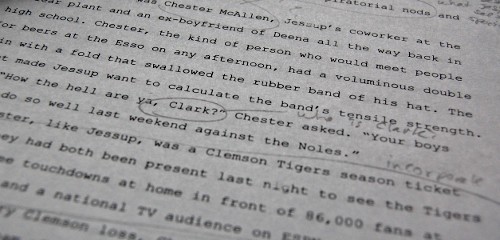
Last June, I began writing my first novel, a thriller about nuclear terrorism. I finished the first draft a month ago and sent two copies to people I know who are avid students of fiction writing. I just got back one copy covered in handwritten notes. The other is still out, Wade Duchene.
When I mailed the manuscript, these were the first two people who had seen the novel aside from my wife Mary. I encouraged the reviewers to be critical, stressing to them that I'm already a published author and understatedly handsome man. My self-esteem is not in jeopardy. They could be brutally honest about weaknesses in the novel. I wanted them to be as tough on the manuscript as the first prospective agent or publisher who pulls it off the slush pile.
This was, of course, a pack of lies.
When I encouraged tough criticism, I only did so in the belief that my novel contained no weaknesses.
Somewhere in the mail, the book acquired some significant flaws. I've been hearing about them at great length over the phone and dutifully taking notes.
Most notably, as it turns out, a man and woman in bloom of first infatuation would not stop to make out when they're minutes from nuclear catastrophe. Even if the man is a decent guy beset by incredibly hard times and she is a beautiful and ballsy college student with corrected vision -- thinly veiled author's wife alert! thinly veiled author's wife alert! -- the imminent death of thousands is a mood killer. It's hard to enjoy having your esophagus grouted by the protagonist's tongue when his skill set is perfectly suited to saving the world.
So I'm now working on the second draft.
One of the things that kept me from writing a novel was the nagging suspicion that I might prove myself a bad novelist. By spending almost 43 years successfully not writing novels, I have kept that dire possibility at bay.
In 1989, Kurt Vonnegut wrote a letter to first-time novelist Mark Lindquist, who had thanked him for being an inspiration. Although Vonnegut makes clear he did not read Lindquist's book, he offers this encouragement:
The fact that you have completed a work of fiction of which you are proud, which you made as good as you could, makes you as close a blood relative as my brother Bernard.
My new goal is to finish the book, making it as good as I could, and become Kurt Vonnegut's blood relative.
